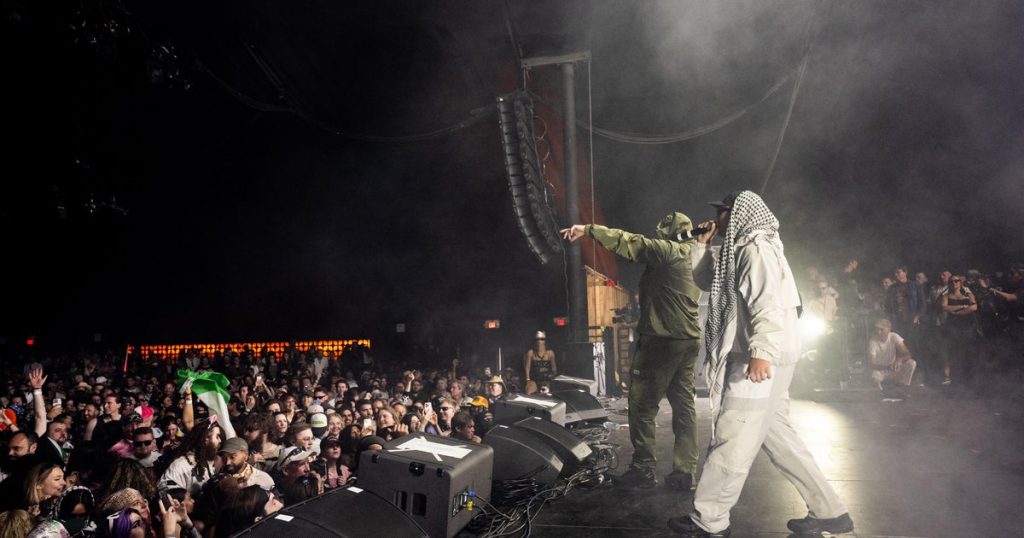Irish hip-hop group Kneecap is under scrutiny following their controversial performances that included statements perceived as supportive of Hamas and Hezbollah. The band has publicly denied these allegations and issued an apology to the families of two British lawmakers murdered in recent years. The fallout from their remarks has drawn condemnation from government leaders and has ignited discussions about political expression in music.
| Article Subheadings |
|---|
| 1) Denial of Allegiance to Terrorist Groups |
| 2) Political Reactions and Official Condemnations |
| 3) Controversial Concert Remarks |
| 4) Impact on the Families of Murdered Lawmakers |
| 5) Broader Implications for Artistic Freedom |
Denial of Allegiance to Terrorist Groups
Kneecap has made clear statements to refute any allegations of supporting Hamas or Hezbollah, two groups that have been labeled as terrorist organizations by multiple governments, including those of the United States and the United Kingdom. The band expressed their position in a social media statement, emphasizing that they “do not and have never supported” these groups. This declaration comes amidst scrutiny following a concert in which one member seemingly shouted supportive phrases regarding these organizations. The controversy has highlighted the need for clarity in public messaging, especially when it concerns sensitive geopolitical issues.
Political Reactions and Official Condemnations
In response to the band’s statements, several political figures have weighed in. Micheál Martin, the Prime Minister of the Republic of Ireland, publicly denounced any form of support for Hamas or Hezbollah, labeling it “unacceptable.” He requested that Kneecap clarify its stance, emphasizing the potential consequences of their public declarations. Meanwhile, a spokesperson for the British Prime Minister, Keir Starmer, condemned Kneecap’s remarks, reflecting a unified front among political leaders against expressions perceived as endorsements of violence.
Controversial Concert Remarks
The backlash against Kneecap intensified following their performances at high-profile events, including a concert earlier this year. Reports indicate that during a 2023 concert, one member of the trio made inflammatory comments calling for violence against Conservative party lawmakers, referring to them in an explicitly hostile manner. This performance, documented on video, has been flagged for investigation by U.K. police. Such remarks have drawn sharp criticism not only from political leaders but also from the general public, raising questions about the appropriateness of such language in a musical context.
Impact on the Families of Murdered Lawmakers
The families of two murdered British lawmakers—David Amess, who was stabbed in 2021, and Jo Cox, who was killed by a far-right extremist—have condemned Kneecap’s statements and called for a public apology. In their recent statement, Kneecap extended their apologies to these families, clarifying that they “never intended to cause hurt.” However, critics, including Brendan Cox, the husband of Jo Cox, have described the apology as insufficient and lacking genuine remorse, emphasizing that the group’s narrative suggested they were unfairly targeted.
Broader Implications for Artistic Freedom
The ongoing situation has sparked a broader debate about the boundaries of artistic expression, especially when it intersects with political discourse. While some advocate for free speech and view performances as platforms for political dialogue, others argue that certain expressions can incite violence and undermine societal norms. This case poses critical questions about the accountability of artists and the responsibilities that come with public platforms. The scrutiny faced by Kneecap could potentially set a precedent for how similar situations are handled in the future, influencing the intersection of politics and music.
| No. | Key Points |
|---|---|
| 1 | Kneecap denies any support for Hamas or Hezbollah, clarifying their stance. |
| 2 | Political leaders including PM Micheál Martin express condemnation of the band’s remarks. |
| 3 | The band’s controversial remarks at concerts have prompted police investigations. |
| 4 | Families of slain lawmakers demand accountability and a public apology from Kneecap. |
| 5 | The incident raises questions about the balance between artistic expression and responsible messaging. |
Summary
The unfolding controversy surrounding Kneecap underscores the complexities of political expression within the music industry. Their recent performances have elicited widespread criticism and led to formal inquiries, highlighting the responsibilities artists hold when addressing sensitive political subjects. As discussions continue, the implications for both the band and the broader community could reshape how artistic messages are perceived and regulated in the future.
Frequently Asked Questions
Question: What actions did Kneecap take following the backlash?
Kneecap issued a public statement denying any support for Hamas or Hezbollah and apologized to the families of murdered British lawmakers.
Question: What specific comments from the band caused the controversy?
During a concert, a member of Kneecap made inflammatory comments suggesting violent action against Conservative lawmakers, prompting calls for accountability.
Question: How have political leaders reacted to the band’s remarks?
Politicians from both the Republic of Ireland and the UK have condemned the band’s comments, emphasizing that supporting groups like Hamas or Hezbollah is unacceptable.


